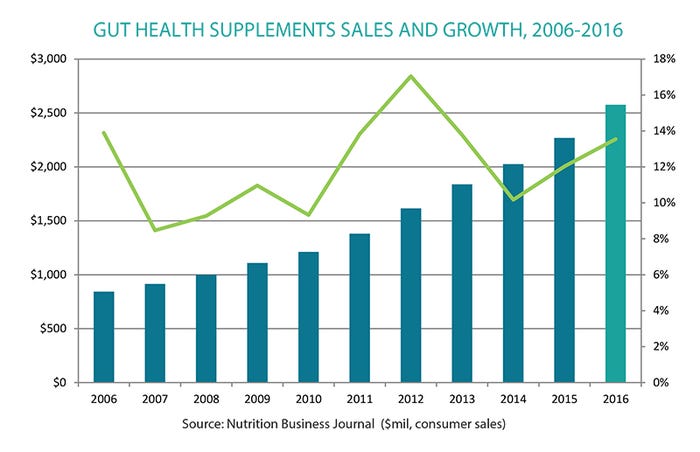February 23, 2018

The story of the nutrition industry is often a story of silver linings—passionate founders motivated by the tragedies and traumas of declining health driving innovation where nobody else saw a need. For every ketogenic potato chip, there is a mother with a child wracked by autoimmune disease. For every natural peanut butter, there are free packs of therapeutic food for malnourished kids in the developing world. Thanks to Martha Carlin, we can add a microbiome stool bank to this mix.
Back in 2002, a Parkinson’s diagnosis for her 44-year-old husband would send Carlin on a self-directed journey through the wilds of citizen science long before anyone had even heard the term. It’s a journey that lands Carlin and the biobank she would come to launch, the BioCollective, squarely inside the beating heart of nutrition’s future. Carlin and her team now operate on the front lines of the industry’s buzziest categories—pre- and probiotics, personalized and precision medicine, the microbiome—with a branded supplement poised to hit the market in early 2018.
For translating a highly personal passion project into a discovery platform that connects the dots between nutrition and the microbiome, we chose to honor Carlin and the BioCollective with the NBJ Science & Innovation Award.
It’s a system
Carlin is not a scientist by training. She’s an accountant. “I learned this primary way to look at a business—transaction flow review,” she says. “You look for the risk points, the places where the business might b reak. Medicine was just not looking at Parkinson’s disease in the right way, so I decided to apply this systems-thinking approach to it.”
reak. Medicine was just not looking at Parkinson’s disease in the right way, so I decided to apply this systems-thinking approach to it.”
Anne Estes, assistant professor at Towson University and the brains behind the popular Mostly Microbes blog, saw the potential early on. “Martha has the brilliance and foresight to bring together different fields to solve complex problems and diseases,” says Estes. “As a self-trained citizen scientist, she connected problems with the gut microbiome to Parkinson’s disease early on.”
Carlin started with food, the primary transaction flow into the body. For the next six years, she would study nutrition and soil biology in her spare time before diving into the deeper science around proteins and metagenomics. She would discover potential correlations between Parkinson’s and childhood incidence of strep throat with heavy antibiotic loads. Interviews with Parkinson’s patients would expand the system to include correlations with allergies and asthma, diabetes, and chronic stress. Two pivotal works of research—Dr. Martin Blaser’s Missing Microbes and Dr. Filip Scheperjans’s 2014 study of microbiota in Parkinson’s patients—would add fuel to her fire that the microbial pathways to disease matter.
Carlin would then connect with Dr. Jack Gilbert at the University of Chicago, a leading researcher in all things microbiome and now co-founder of the BioCollective, to study time series samples of her husband and herself, pushing for insights from the food supply that could work as microbial tools for modifying specific gene behavior. As clear evidence that smart minds think alike, Gilbert is one of the research community’s strongest proponents of shared science that fosters collaboration. He’s a citizen scientist, too.
Making it easy
As the idea for the BioCollective began to take form, Carlin focused on the pain points. Collecting samples carries a high ick factor, so why not invent a friendlier kit—enter the BioCollector. Access to samples is tough for researchers, so the BioCollective now provides well-characterized fecal samples as well as licensing to metagenomic sequencing data. That sequencing gets expensive, so the BioCollective shares costs over a wide number of users with no charge to sample providers. “These are all problems at the consumer level,” says Carlin. “I wanted to build a company that focused there, so we can all move faster with this.”

John Flattery, Director of Research and Innovation at Aces Health in Atlanta, Georgia, sees the power of that approach. “The BioCollective has scalable and affordable solutions that can propel the field of microbiome medicine to new heights. Solutions that monitor the microbiome in scalable ways will be critical in the evolution of precision medicine paradigms.”
The BioCollective is moving beyond sequencing highly conserved segments in the bacterial genome to provide a fuller picture of viruses, fungi, markers of antibiotic resistance, and strain-level bacteria. There are 700 samples in the biobank and counting, with strong cohorts in Parkinson’s, as well as growing cohorts in sickle cell, autism, and IBS. Data modeling is pointing toward patterns across disease states—from Parkinson’s to thyroid to chronic gastrointestinal issues—in a shared functionality model that proves the power of systems thinking. In a further tip of the hat to the power of citizen science, Carlin is also developing a profit-sharing model that rewards sample providers as their stool sells over time to researchers and institutions.
What’s next?
Carlin is scheduled to launch her first product—Sugar Buster Biotica—in February as a supplement to address glucose metabolism in the body. It’s a pre- and probiotic formula with multiple specific strains, including one proprietary to Pure Cultures, an agricultural probiotic company in which Carlin was an early investor. Time series data has demonstrated meaningful impact on the microbiome.
Her success and savvy are getting noticed, by the industry and academia.
“Martha’s systems-level insight on disease led her to assemble a world-class team of researchers to investigate the gut microbiome community and develop a targeted probiotic to rectify the microbiome dysbiosis,” says Estes. “Her intelligence, passion, and resourcefulness is astounding.”
As for the biobank, it’s all about collecting more samples to connect more dots. “That’s what we want,” says Carlin. “We want to build the platform that connects these dots for the microbiome. There’s so much competition in the research community now, so little sharing. Collaboration has the potential to solve these complex problems much faster, so we’re working hard to open up the science.”
 This article is from the February issue of Nutrition Business Journal. Download the full issue with all of the 2017 NBJ Award winners for free here.
This article is from the February issue of Nutrition Business Journal. Download the full issue with all of the 2017 NBJ Award winners for free here.
About the Author
You May Also Like



